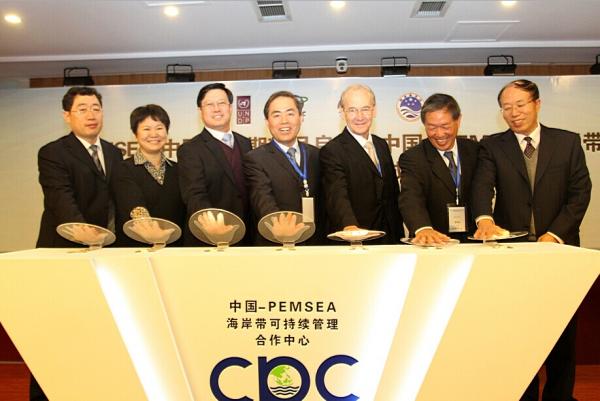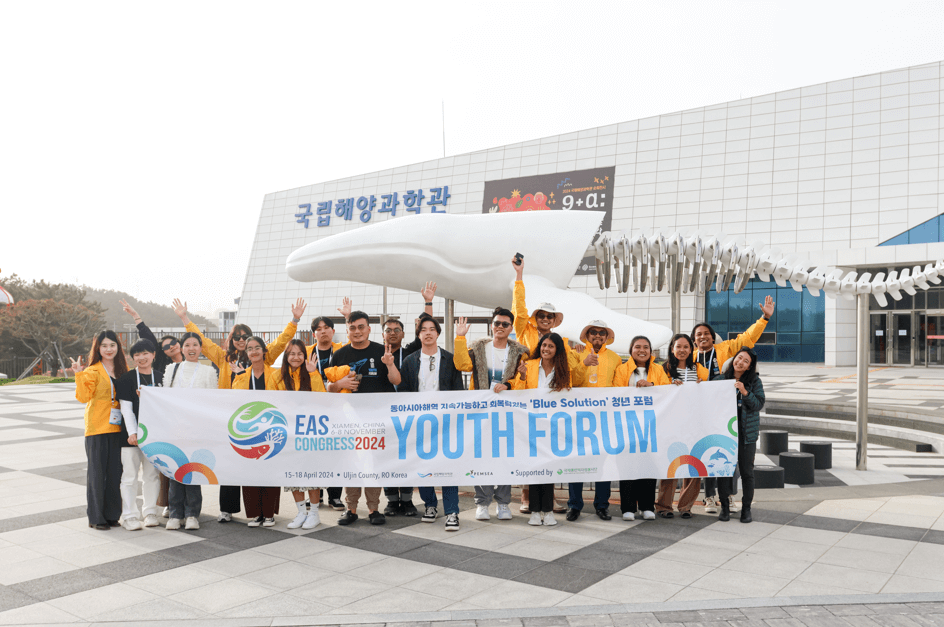How PEMSEA Helps Scale Up Sustainable Coastal Development
Monday, 1 August 2016

While PEMSEA is well discussed in the GEF International Waters community as an intergovernmental organization fostering sustainable coastal development and regional ocean governance through implementation of the Sustainable Development Strategy for the Seas of East Asia (SDS-SEA), what is less known is its initiative in establishing the China-PEMSEA Sustainable Coastal Development Cooperation Center (CPC) as a pilot project to scale up SDS-SEA implementation in a Partner Country. Established through a memorandum of understanding between Dr. Zhang Haiwen, National Focal Point of the State Oceanic Administration (SOA) of PR China, and Mr. Stephen Adrian Ross, Executive Director of PEMSEA, in November 2014, the CPC is hosted by the First Institute of Oceanography (FIO) of SOA and aims to provide technical services to Chinese local governments for implementing of the SDS-SEA, conducting trainings and certification of ICM systems and identifying, developing and implementing cooperation projects between China and Partner Countries in support of SDS-SEA implementation. The CPC is financially supported by SOA, with funding of 500,000 yuan (US$75,000) in 2015, and administratively managed by FIO of SOA with the same amount of matching funding with SOA. For the time being, PEMSEA’s support to the operations of CPC is through the UNDP/GEF Scaling up SDS-SEA Implementation Project, in the amount of US$140,000 annually up to 2019. Through an annual Management Committee meeting, the National Focal Point, Director of CPC, Director of FIO’s International Cooperation Department and Executive Director of PEMSEA discuss and review an annual work program and provide directions to CPC to better align its programs to its mandates and emerging needs of coastal management of the national and local governments. The Director of the CPC is Professor Qiao Fangli, a renowned oceanographer in China on ocean dynamics and climate, and President in charge of the FIO/SOA. Under his leadership, the UNESCO/IOC Regional Training Center on Ocean Dynamics and Climate was established in FIO as a collaborative program between UNESCO/IOC and SOA. He is assisted by Dr. Zhang Zhaohui, Deputy Director of CPC and Associate Professor in FIO/SOA specializing in marine protected areas (MPAs) and integrated coastal management (ICM). At working level, the Center has four technical and one administrative staff operationalizing a portfolio of ICM and special skills training, program development and implementation and general support services. The CPC is supported by a national task force team consisting of eminent policy makers, specialists and oceanographers from institutions under SOA, universities and research institutes in China. The team is headed by Professor Wen Quan, Chief Scientist of National Marine Environment Monitoring Center of SOA and a planning expert for marine science and blue economy development.

Inauguration of China-PEMSEA Sustainable Coastal Development Cooperation Center (CPC) at First Institute of Oceanography (FIO) of SOA, participated by (from left to right): Director of CPC Dr. Qiao Fangli, Director General of SOA Dr. Zhang Haiwen, Vice Mayor of Qingdao Mr. Wang Xiaofang, SOA Vice Administrator Mr. Chen Lianzeng, PEMSEA Executive Director Mr. Stephen Adrian Ross, PNLG Secretary General Mr. Pan Shijian, and President of FIO/SOA Mr. Ma Deyi. Photo courtesy of the CPC.
With the CPC in place, capacity development for SDS-SEA implementation are organized and planned more strategically. In 2015, PEMSEA hosted the 6-month internship of a CPC training specialist, Ms. Zhang Lingyu, with delivery of a draft national ICM capacity development program up to 2019, a program many other GEF grant recipient countries still do not have. The program identifies 14 priority needs from 20 ICM demonstration and replication cities in China. The first training workshop for these cities will be conducted in September 2016 featuring steps to conduct disaster risk management planning with assistance of the Asian Disaster Preparedness Center (ADPC), a new PEMSEA collaborator identified at the EAS Congress 2015.
In 2015, the CPC organized and facilitated training of 19 Chinese experts, officers and staff in application of technical tools in vulnerability assessment, MPA management effectiveness tracking, ecosystem approaches to fishery management and conceptualization of ICM code and certification criteria and process. Through targeted training of national task force members in line with the national ICM capacity development program, the CPC was able to initiate assessment of vulnerability to sea level rise in Dongying City, and organize a training of the internal auditors of local governments in preparing for ICM system certification. Two trainees from CPC assisted PEMSEA ICM specialist, Mr. Danilao Bonga, to conduct an audit of 6 Chinese cities. To fully scale up SDS-SEA implementation to the remaining 52 coastal cities in China, the CPC has plans to develop the national ICM system certification guidelines to help further institute ICM system in ICM priority and replication sites with support of the UNDP/GEF Scaling up SDS-SEA Implementation Project.
Coordinating the implementation of SDS-SEA by the National Focal Point requires good backstopping at both technical and management levels. The CPC is now able to serve as the coordinating body for executing the UNDP/GEF Scaling up SDS-SEA Implementation Project in China from planning, fund management and project oversight, through quality assurance by the national task force and reporting of progress on a regular basis. This is different from other countries where the project is implemented at the local level, creating more ownership of project results by PEMSEA national focal agencies and higher chances of scaling up good practices through policy integration at the national level.
Effective implementation of the SDS-SEA at national and sub-national levels, engagement of stakeholders and development of partnerships, as practiced by PEMSEA in the past two decades, should be translated into national and sub-national actions as well. For example, in 2015, CPC staff visited and began to engage with universities, local governments, NGOs and the business community to expand PEMSEA’s network in China. In the same year, Ocean College of Zhejiang University joined the PEMSEA Network of Learning Centers (PNLC) and will organize an MPA training workshop in collaboration with the CPC in 2016. Sanya City joined the PEMSEA Network of Local Governments (PNLG) in 2016 and expressed its willingness to host the PNLG Annual Forum in 2017. With the combined efforts of CPC and PEMSEA, China has witnessed the growing participation of the private sector in SDS-SEA implementation, exemplified in Dongtian Park Co. Ltd., who submitted a request to join the East Asian Seas Sustainable Business Network (EAS-SBN).
Perhaps the greatest help to the National Focal Point from the CPC was its support in organizing participation at the East Asian Seas (EAS) Congress 2015. Nearly 80 representatives from China participated at the EAS Congress, including 13 self-funded youth delegates from 12 universities and representatives from the China PPP Center, China Water Group, Dongtian Park Co. Ltd. and nearly 40 officials from 13 local governments, including 15 resource persons who served as Chairs, speakers and panelists in various workshops at the Congress. With assistance from CPC, the Congress program and information bulletins, and PNLG program and information bulletins were translated into Chinese to facilitate the participation of local government representatives at various events of the Congress in a more meaningful and effective way.
In the area of program development in support of SDS-SEA implementation, there has been good progress with CPC’s research project proposal on observation and responses to the impacts of climate change in coastal areas in the East Asia region. Conservation of the Irrawaddy Dolphin and Humpback Dolphin and their habitats through ICM, in support of the Aichi Biodiversity Targets, is another initiative currently under development between CPC and PEMSEA. Establishing the CPC is a pioneering effort of the SOA and PEMSEA to sustain SDS-SEA implementation in partner countries by strengthening institutional capacity in a systematic and innovative manner. After one year of operation, PEMSEA is glad to see that the CPC views the China-PEMSEA cooperation in a more strategic, systematic and coordinated manner. There is still much to expect from the CPC. From SOA’s perspective, this pilot initiative is also set to contribute to blue economy development in the East Asia region through PEMSEA. In a recent face-to-face discussion with CPC Director Professor Qiao Fangli, he suggested that the CPC consider developing a professional program for training and certification of valuators of marine ecosystems. “Blue economy is all about maintaining the natural capital and services of marine ecosystems. Building a community of professional valuators is an imperative towards this end”, said Professor Qiao.
[Prepared by Mr. Fengkui Liang, Associate Counsel, Department of International Cooperation, State Oceanic Administration, People’s Republic of China. He can be contacted by email liangfengkuisoa@163.com]
For further information about the CPC, please contact:
Contact person: Dr. Zhang Zhaohui
6 Xianxialing Road, laoshan District, Qingao, Shandong Province, China, 266061
Tel: +86 532 8896 8526
Fax: +86 532 8889 3882
Email: pemsea@126.com
Website: http://www.pemsea.cn



